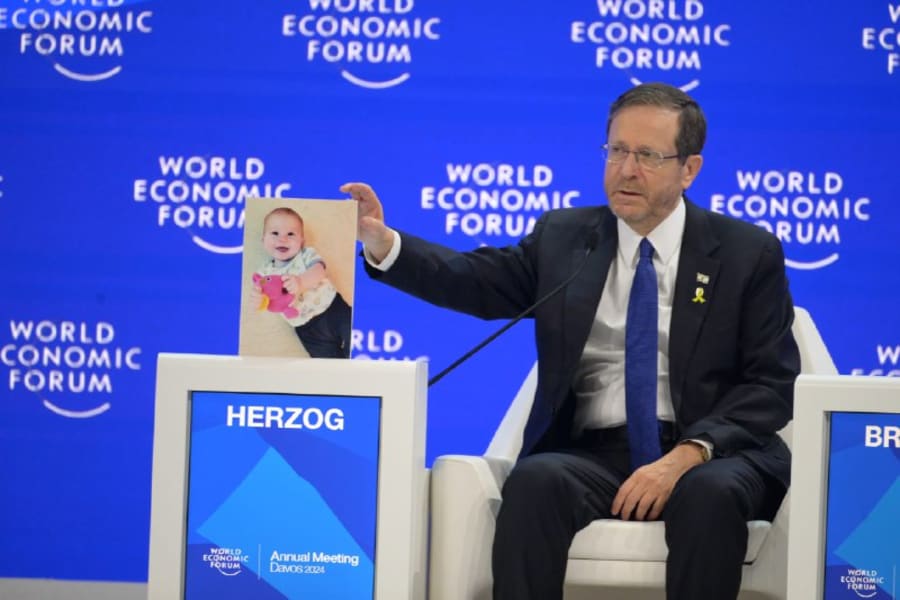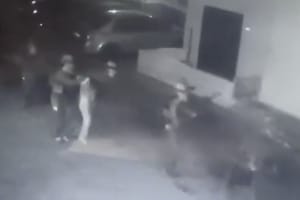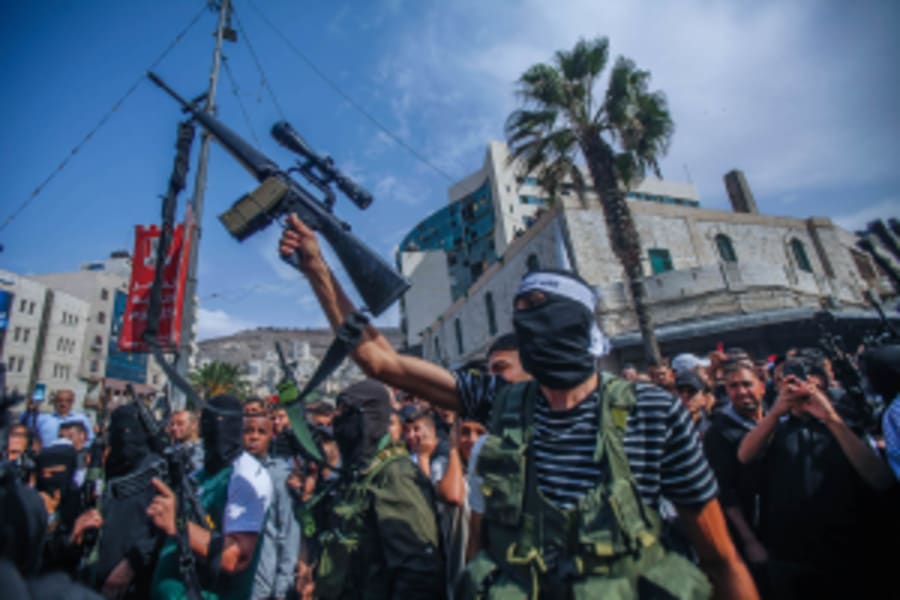Israeli President Herzog to the WEF: 'There is an empire of evil emanating from Tehran'
Bringing a photograph of Israeli hostage Kfir Bibas on stage, Herzog told the audience Bibas’ story

Israeli President Isaac Herzog participated in a public conversation with World Economic Forum President Borge Brende on Thursday, in which Herzog warned the assembled leaders of the Iranian regime and the global network of jihadists it funds.
The comments came in the midst of a discussion that covered a variety of topics relating to the Israel-Gaza war, with the WEF president asking questions about the hostages, the humanitarian situation in Gaza, Israel’s 2005 decision to pull out of Gaza, the path to peace in the region, and more.
Herzog began by calling the audience’s attention to the many hostages in Gaza, “including Muslims, including women, foreign nationals, young girls, older women, Holocaust survivors,” and more.
Bringing a photograph of Israeli hostage Kfir Bibas on stage, Herzog told the audience Bibas’ story:
“This is Kfir Bibas. Kfir today is celebrating one year to his birth. Exactly a year ago he was born to his parents, Shiri his mother and his father Yarden, and his brother Ariel. His whereabouts are unknown. We know he was kidnapped by Hamas. We know that these barbaric terrorists have taken him and his mother and his brother, and his father held in a different place. We know that they are going through hell, and we don't know their whereabouts.”
Herzog then pointed out that the massacre of Oct. 7 did not occur merely as a result of a political conflict. Rather, he argued, it was motivated by a radical Islamic ideology.
“The enemy – who supposedly advocates he has a cause in life – is basically advocating jihadism, celebrating and glorifying terror, celebrating and glorifying the abduction of Kfir Bibas. And from here, this incredible world stage, I call upon the entire universe to work endlessly to free Kfir, and all the hostages that are there—about 136 by now.”
It is this jihadist ideology, Herzog argued, which is the root cause of the lack of peace in the region. When asked by Brende about the prospects for peace in the region, Herzog said peace could not come without the commitment of all parties to condemn and oppose terrorism.
“I have a message to all our neighbors first of all, and especially to the Palestinians,” Herzog said. “I've been advocating and calling for peace with our neighbors for years…Terror is the main impediment to moving towards peace. You cannot accept terror directly or indirectly, you cannot justify it—it has to be totally stopped and out of the question.”
Herzog stressed that Israelis are not focusing on peace talks agreements or negotiating the establishment of a Palestinian state—rather, their top priority is maintaining the security of their own nation: “If you ask an average Israeli now about his or her mental state, nobody in his right mind is willing now to think about what will be the solution of the peace agreements, because everybody wants to know, can we be promised real safety in the future?”
Herzog also emphasized the fact that many of the world’s worst terrorist groups—including Hamas, Hezbollah, and the Houthis—are being funded and armed by Iran, which seeks to undermine Israel, Europe and the United States.
“There is an empire of evil emanating from Tehran, spending billions of dollars in arms and money and people's well-being to derail the entire stability of the world and the region,” Herzog stated. “They've attacked the United States forces two nights ago, openly. They have proxies all over the region quietly lurking to undermine any peace process and any stability of the world.”
WEF president Brende also inquired as to whether Herzog believed that past Israeli policy had exacerbated the conflict, including the decision to pull out of Gaza in 2005, some time after which Hamas was able to gain control of Gaza.
“What would you say to those who say that Israel let Hamas then win those elections and accepted it?” he asked.
Though Herzog stated: “I understand a lot of the criticism about that, clearly,” he also made it clear that he was unwilling to answer the question. “Because it's becoming now a major political debate issue, I would not want to allude into that.”
In addition to talking about the history and present status of the conflict, Herzog said he remained optimistic about advancing regional peace and cooperation as had been done through the Abraham Accords. Particularly, Herzog said that Israel remains committed to pursuing normalization with Saudi Arabia.
“The Saudi option,” Herzog argued, as a part of “the whole normalization process,” will be “the key to the ability to exit from the war into a new horizon.”
Acknowledging that the situation is “still delicate” and “will take a long time,” Herzog affirmed his belief “that it is actually an opportunity to move forward in the region towards a better future. I view that as a very important development. I encourage all parties who are discussing the option of normalization with Saudi Arabia.”
The conversation ended with Herzog sharing a story about meeting a Gazan woman in an Israeli hospital, who “was quite shocked that the leader, the head of state walked into her room.” Herzog said that she told the woman, “I bless your child and I hope you will live in peace.”
“I believe this is the vision that we have to project,” Herzog concluded. “People want to live together, and they want to live in peace. The coexistence in Israel of so many lives and beliefs, including between Palestinians and Israelis, is immense. But we cannot allow forces of evil who want to ruin this vision and want to drive us into the abyss. We can’t allow them to win.”

The All Israel News Staff is a team of journalists in Israel.












